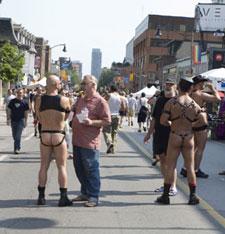The organization behind popular gaybourhood events including Halloweek and the Church Street Fetish Fair is considering cutting back its offerings in 2009 because of increased costs from the city — but insists the additional charges are fair and that, to some degree at least, the events are falling victim to their own success.
“Our events are becoming larger and that leads to increased costs,” says Church Wellesley Village Business Improvement Area (CWVBIA) coordinator David Wootton, “and the only thing that really changed was police costs.”
As examples Wootton cites CWVBIA’s 2008 contribution to the citywide arts celebration Nuit Blanche, which included an expanded street closure extending north to Cawthra Square Park from Wellesley. Wootton says the expansion accounts for the fact that the event’s policing budget doubled to $14,000 in 2008 from $7,000 in 2007.
Similarly last year’s Halloweek celebrations also extended north of Wellesley and policing costs grew accordingly, says Wootton, who also served as executive director for last year’s Halloweek.
In addition to hiring more officers for events Wootton says the rates for those officers are going up in 2009. According to Wootton the hourly rate for police constables has been increased to $65 per hour, with sergeants costing as much as $84 per hour. According to a report posted on the City’s website the rates in 2008 were $62.50 per hour for constables, $70.50 for sergeants and up to $79.50 for staff sergeants.
“Based on information provided by the City, and given our past experiences, I think the cost increases have been fair,” says Wootton. “I don’t think we are being overcharged. We are being supported in our endeavours by the City of Toronto. Those endeavours, however, may have to change.”
But other BIA’s are finding ways to minimize costs associated with city services. Tonny Louie was the 2008 Chinatown Festival chair, a festival presented by the Chinatown BIA. He says the key to keeping costs low is to find out what the minimum requirement is in terms of using city personnel.
“If you need extra security, find out how much is required by the City and work with the police to find out what is allowed in terms of hiring private security, which is cheaper,” says Louie. “If you don’t do that, you’ll always be priced to the max.”
Although the geographic size of the Chinatown fest increased in 2008 the cost of police and security was reduced from $11,000 in 2007 to $7,000 in 2008, says Louie.
Did the police give him a hard time about hiring private security? “Of course they did,” he says. “That’s why you need a good contact at your local police division. It’s all about personal relationships. If you go strictly by the books, you won’t find any help anywhere.”
Louie says the Chinatown Festival also assembled a volunteer cleanup crew so that the BIA didn’t have to pay the city for all of it.
“You really can’t expect too much from the city,” says Louie. “They may show you how to do certain things but they’re not going to hand the money over to you. Yes, get what you need from the city, but then go out and get the rest. Find the money — that’s the organizer’s job.”
As a way of making it more attractive for local businesses to support it the Chinatown Festival produced a 16-page brochure with ad space for merchants. “In the past we would ask for money, but the merchants wouldn’t get anything in return,” says Louie, who is also a member of the Chinatown BIA board.
In the end Louie says the Chinatown Festival budget remained the same from 2007 to 2008 — roughly $73,000 — but had more programming, increased media exposure and a larger territory.
Although Wootton says CWVBIA was more successful in attracting corporate sponsorship for its events in 2008, to date Wootton says CWVBIA isn’t employing either of the cost-cutting strategies employed by the Chinatown BIA. As far as private security goes, “That is something that would need to be sourced and I already have too much on my plate right now,” he says. “Plus the price is comparable. Also we are trying to establish relationships with the City that will benefit us in the future.”
He says a good relationship with the City is part of why CWVBIA wasn’t charged for a permit for Halloweek’s dog show.
Wootton says he’d like to depend more on volunteers to reduce costs, but “we had no volunteer support last year [for Halloween],” he says. “People just didn’t want to give up their Halloween so the night of Halloween we had absolutely no volunteers.
“The community at large has to see that if they want these events, they have to get involved.”
So are the CWVBIA’s events on the chopping block this year? “Everything is being reviewed at this time,” says Wootton. “This year we could implement another notion of Halloweek. I can’t really say at this point because we are still developing it. I mean, it’s not like we won’t do Nuit Blanche, but we might reconsider how we do it.”
A questionnaire was handed out to attendees at CWVBIA’s annual general meeting in November to solicit ideas on what it should do differently in 2009. CWVBIA’s first regularly scheduled board meeting of 2009 took place Jan 5, but Wootton says there probably won’t be any decisions to report until February.
“First, we have to hear from our members — the merchants — and their needs,” he says. “The merchants are our first priority, the community is our second priority. Still, our goal is to create events with the community to keep our neighbourhood alive and well.”

 Why you can trust Xtra
Why you can trust Xtra


